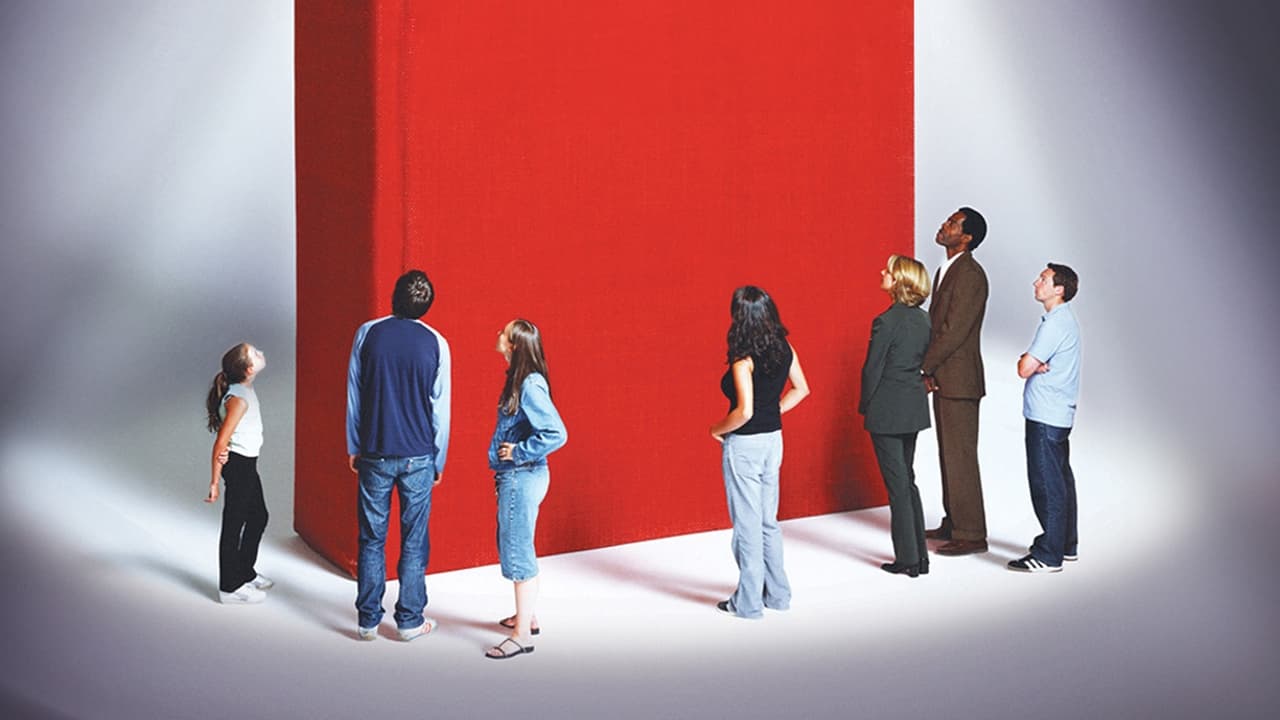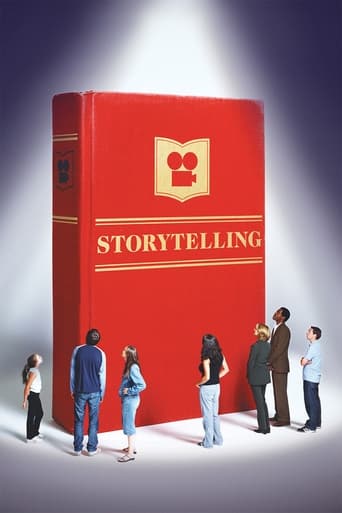Kattiera Nana
I think this is a new genre that they're all sort of working their way through it and haven't got all the kinks worked out yet but it's a genre that works for me.
Cassandra
Story: It's very simple but honestly that is fine.
Kayden
This is a dark and sometimes deeply uncomfortable drama
Darin
One of the film's great tricks is that, for a time, you think it will go down a rabbit hole of unrealistic glorification.
Adam Gai
Todd Solondz's Storytelling could be looked at as a film about film (the second part),and a film about fiction in general both parts). The first part named precisely Fiction tells the misadventures of a young couple studying creative writing at the University. Marcus, a brain damaged, and Vi, his girl friend, seem to be dragged by their sexual drives when composing their texts.He will read in the writing class a story about an invalid proud of his handicap (a sweetend narrative about his own situation). The text being reported will be deadly criticized by their implacable teacher, a black who was winner of a Prize Pulitzer. Vi's eventual sadomasochist affair with the same teacher gives her material for her next writing exercise, which would also suffer appalling remarks.She is convinced it is a good story, merely because based on true facts. The judgments by the writing pals hardly hide their own superficiality and clichés. The teacher, on his side, exploits his evaluating skills to refer indirectly to his own depraved relation with her. Creating fiction serves to settle one's account with somebody. What characters say and do, lacks, more often than not, correspondence with what they think, and in many cases they are unable to grasp the absurdities of their statements. In the second part, named Non-Fiction, Fern Livingston, the mother in the Jewish middle-class family, argues and believes that she and her off-springs are virtual victims of the Holocaust, notwithstanding her parents had emigrated from Europe before it. Scooby the supposed rebel in the family, who repels going to study at the University, dreams about becoming a television talk- show celebrity and is steady convinced of his talents: "I'm not an idiot man, I watch TV" (Could it be that most of the spectators wouldn't easily endorse this assertion). Cynical dialog reaches high tops in the scene, wherein Mickey, the infatuated youngest son in the family, asks the housemaid what it's the meaning of rape. She answers: "It is when you love someone and they don't love you and you do something about it". Solondz draws a ferocious caricature of American people, blacks, whites, rich, poor, adults and children, who are puppets of their ignorance, prejudices and wickedness, and live their fantasies as indisputable facts. Also the amateur director in the story, who decides to shoot a documentary movie about Scooby experiences at the High School, and considers himself to be an objective witness of reality, seems not to be aware of his unscrupulousness. When the boy uncovers his hypocrisy: "You are a pervert", Toby, the director, denies it, without pondering the dangerous implications of his reply: "No. Actually, I am a documentary filmmaker". The spectators could willingly fall prey of this Solondz's juicy, sardonic, grotesque tragedy in two episodes, like flies trapped in an attractive but sticky mass. The hypnotic musical theme accompanying the initial credits paves the way to. Adam Gai
Adam
*MAY CONTAIN SPOILERS* All in all, this film was hard to watch at times. I knew going into it that it was going to be a somewhat disturbing experience. It is Solondz after all. However, when you compare it to his previous films, "Happiness" and "Palindromes", it seems like Sesame Street in comparison.The film is split up into two parts: "Fiction" and "Non-fiction". The first story deals with a young lady who has enrolled in a writing class with her handicapped boyfriend. Her teacher is an overbearing and brutally honest black man. It is apparent that there is some sexual tension between the two of them. She dumps her boyfriend, goes to a bar one night, and her professor just so happens to be there. She ends up back at his place, and something horrible happens to her that pretty much ruins her emotionally. She writes a fictional short story based upon what happened to her that night Everyone in class accuses her of exploitation, of being a racist, etc. Her only response to the harsh criticism: "But it really happened!" Powerful stuff...The second half of the film deals with a documentary filmmaker who is basically supposed to represent Solondz himself. He wants to make a film about teenagers living in modern day suburbia, and he chooses a slacker named Scooby to be his subject. Scooby comes from an extremely dysfunctional family, headed by his extremely temperamental father. Scooby doesn't know what he wants out of life, doesn't even care to take the SATs at school, and wants to be a talk show host when he grows up. He has two brothers. One is your typical high school jock, and he thinks that Scooby is gay. His younger brother is a demonic little intellectual brat who is continually harassing the maid, and on occasion, hypnotizes his parents to get what he wants. However, the documentary filmmaker insists that he cares about these people and decides to go on with his project. There are moments here where it is clear that Solondz is making a statement about past criticisms of his films. Anyone who has done any research on the director will pick up on this. Scooby pours his heart out in front of the camera, telling of his hopes and dreams. He ends up taking the SAT, albeit in a very unconventional way. All the while, the filmmakers intentions become less and less honorable. I will stop there for fear of giving away the shocking ending.Solondz may be letting off a little steam here, and some of it feels gratuitous. However, it gives you plenty of food for thought, and you won't be able to think about anything else for a while.
becke409
the soundtrack for this movie was done entirely by Belle & Sebastian, but most of the songs recorded by them aren't in the movie. their full soundtrack is released as an amazing album.that soundtrack is better than the movie itself in many ways, since the moral statement of the film, about the power of art to distort reality gets lost in the spectacle of the movie. the unsuccessful film screening is a perfect summary of the whole film. not to say i didn't like this movie, i do. i just think that it has a muddled point and muddled execution, which is an interesting commentary on the ability to control your art and say a good moral message: life and art get messy and a real moral tale is hard to tell realistically.
zygirl513
It's not so much that this movie chose to depict a rather nefarious view of humanity; it's that this movie eliminated the possibility of anything but in the world of the characters. If someone made a movie, in this day and age, in which all the characters were happy, secure, whole and loved, a lot of people would be bored. And say that it's not very realistic. Well I was bored. A deep and subtle boredom, that (upon waking) causes one to question whether they're bored; cause that would mean feeling something...when it kind of just feels like nothing.This movie was boring. And it wasn't very realistic.

